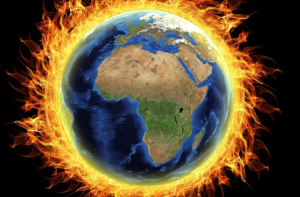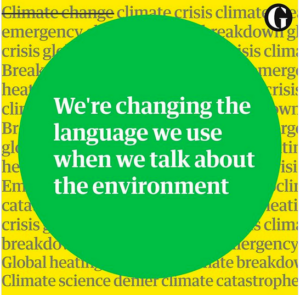Climate Change Linguistic Tipping Point
How we talk about climate change is shifting
In past issues we have written about how one can, should, or should not talk about climate change. A dilemma has always been that if one tries to scare people, one might well frighten them so that they take action on climate change, or one might just frighten them away, because they are immobilized by the threats. Some lean to softening the linguistic approach on climate change, and some still prefer getting heavy handed.
Some tailor their words to the specific audience. Supporters of climate change action get the frightening version as they “know” the scary impacts are likely to be true, and this version reinforces their engagement and contributions. People on the fence — the undecided, the skeptics and deniers —get a slight nudge, hoping they will eventually come around.

© Susan Smith, with permission of the artist
We’re now seeing a shift in the use of words to talk about climate change
The shift, or tipping point, has been unfolding over the past six months or so. A “tipping point” refers to a moment or space which previously had been in balance, or stasis, but which becomes unbalanced when something is added to cause it to change significantly. In many instances a tipping point suggests a negative outcome, but it need not be, and positive outcomes can flow from a tipping point. Here we use the term, almost metaphorically, to refer to a significant consolidation, indeed strengthening, in the language used to support climate change actions after an extended period when there was a semblance of balance between those who softened their language and those who hardened their words.
We suggest this toughening of the language derives in part from the more dramatic predictions on the impacts of climate change that we have begun to hear from even the generally staid scientific community. In a recent report (October 2018), the International Panel on Climate Change (IPCC), the leading international scientific authority on all things related to global warming, warns that we have only 10 to 20 years to avoid the impacts of intense and more heat waves and hot summers, greater sea level rise, and worse droughts and rainfall extremes. Another recent report (May 2019) for the United Nations demonstrates that humans are putting up to one million plant and animal species at risk of extinction, posing a direct threat to biodiversity across the globe.

The reports are dire, in the consequences they document and in the short period of time they tell us we have to avoid these consequences. The noted environmentalist David Attenborough, not given to exaggeration, spoke at a recent United Nations climate summit in Poland about the possible “collapse of our civilizations and the extinction of much of the natural world.” See Moyers article below.
These reports in and of themselves might have set the shift in motion but they were prodded along by the engagement of a youth movement that has arisen lately, across many communities. The movements are called Extinction Rebellion, or Sunrise Movement, or Childrens Trust (climate change lawsuits for youth), or Youth Climate Strike, or Alliance for Climate Education, or Youth Climate Movement, or Greta Thunberg. They bring a boldness, brashness and directness to the conversations on climate change, and at times some blistering attacks. Bill McKibben has described what is happening as a result of the youth movements as a “climate moment.”
Yet perhaps the strongest voice to be heard so far is nature itself, which has been delivering floods and droughts and firestorms, seemingly everywhere, sometimes one following the other, sometimes all at once somewhere on the globe.
So now more and more people have declared that “climate warming” is no longer accurate, nor is “climate change.” The Guardian British newspaper, one of the strongest on environmental issues, has recently announced a change in its style guide “to introduce terms that more accurately describe the environmental crises facing the world.” Instead of “climate change” the preferred terms are now “climate emergency,” or “climate crisis,” or “climate breakdown.” And “global heating” is chosen over “global warming.” At the same time, The Guardian has also shifted to using “wildlife” instead of “biodiversity,” which was always a rather abstract term.

Others have described the realities of what we are facing as “climate destruction” or “climate disruption” or as an “existential threat.”
Other media outlets have acknowledged The Guardian’s initiative and are considering making similar changes. But perhaps it is best to leave the last word to Greta Thunberg, the Swedish teenager who has inspired school strikes for climate around the globe, who said: “It’s 2019. Can we all now call it what it is: climate breakdown, climate crisis, climate emergency, ecological breakdown, ecological crisis and ecological emergency?”
Sources:
Robert Emmet Hernan, “It’s Time to Scare the Bejesus Out of People about Climate Change” in ieBLOG section of www.irishenvironment.com (April 2014). bit.ly/2YMDj5m
Robert Emmet Hernan, “It’s Time to Scare the Bejesus Out of People about Climate Change (Part 2) – More Bejesus Needed, But for Whom?” in ieBLOG section of www.irishenvironment.com (April 2017). bit.ly/2Ewl2RZ
“A Tipping Point on Climate Change in Ireland?” in Reports section of www.irishenvironment.com (Jan 2018). bit.ly/2MHVNSd
Jonathan Watts, “We have 12 years to limit climate change catastrophe, warns UN,” The Guardian (8 Oct 2018). bit.ly/2E7MhED
“Even more dire reports from the IPCC about devastating effects of climate change” in ie BLOG section of www.irishenvironment.com (Nov 2018).
Jeff Berardelli, “Youth are changing the game on climate change,” CBS News (13 March 2019). cbsn.ws/2JyFKEM
Bill Moyers, “What if we covered the climate crisis like we did the start of World War II?” The Guardian (22 May 2019). bit.ly/2QdahIO
Gaia Vince, “The heat is on over the climate crisis. Only radical measures will work,” The Guardian (18 May 2019). bit.ly/2JtKYBX
Oliver Milman, “Climate crisis more politically polarizing than abortion for US voters, study finds,” The Guardian (22 May 2019). bit.ly/30D12Xp
Bill McKibben, “Notes from a Remarkable Political Moment for Climate Change,” The New Yorker (1 May 2019). bit.ly/2Wlst5g
Damian Carrington, “Why the Guardian is changing the language it uses about the environment,” The Guardian (17 May 2019). bit.ly/2WMBPY0
Oliver Milman, “Guardian spurs media outlets to consider stronger climate language,” The Guardian (24 May 2019).


No comments yet, add your own below